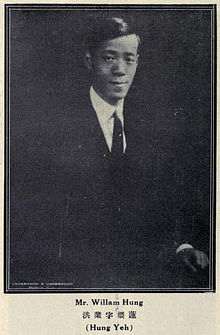William Hung (sinologist)
| William Hung | |||||||||||||
|---|---|---|---|---|---|---|---|---|---|---|---|---|---|
 |
|||||||||||||
| Native name | 洪業 | ||||||||||||
| Born |
October 27, 1893 Fuzhou, Fujian, Qing Empire |
||||||||||||
| Died | December 22, 1980 (aged 87) Cambridge, Massachusetts, United States |
||||||||||||
| Nationality | Chinese | ||||||||||||
| Fields | Classical Chinese, Chinese literature | ||||||||||||
| Institutions |
Yenching University Harvard University |
||||||||||||
| Alma mater | Ohio Wesleyan University | ||||||||||||
| Notable students | David Nivison, Teng Ssu-yu, Francis Cleaves | ||||||||||||
| Known for | Harvard Yenching Index Series; Tu Fu: China's Greatest Poet | ||||||||||||
| Notable awards | Prix Stanislas Julien | ||||||||||||
| Spouse | Rhoda Kong | ||||||||||||
| Children | 2 | ||||||||||||
| Chinese name | |||||||||||||
| Traditional Chinese | 洪業 | ||||||||||||
| Simplified Chinese | 洪业 | ||||||||||||
|
|||||||||||||
| Transcriptions | |
|---|---|
| Standard Mandarin | |
| Hanyu Pinyin | Hóng Yè |
| Wade–Giles | Hung Yeh |
| Southern Min | |
| Tâi-lô | Âng Gia̍p |
William Hung (Chinese: 洪業; 27 October 1893 – 22 December 1980), was a Chinese educator, sinologist, and historian who taught for many years at Yenching University, Peking, which was China's leading Christian university, and at Harvard University. He is known for bringing modern standards of scholarship to the study of Chinese classical writings, for editing the Harvard-Yenching Index Series, and for his biography, Tu Fu: China's Greatest Poet. He became a Christian while a student at the Anglo-Chinese College in Fuzhou, then went to Ohio Wesleyan University, Delaware, Ohio, Columbia University, and Union Theological Seminary. On his return to China, he became Professor and Dean of Yenching University, where he was instrumental in establishing the Harvard-Yenching Institute. He came to Harvard in 1946 and spent the rest of his life in Cambridge, Massachusetts, teaching and mentoring students.
William Hung was the oldest of six children. His father gave him the "school name" Hong Ye ("Great Enterprise"), and then when he left for the United States he took the given name William. He married Rhoda Kong in 1919, and the couple had two children, Ruth and Gertrude.
William Hung was born on 27 October 1893 in Fuzhou. In 1901 Hung traveled with his family from Fuzhou to Shandong, where Hung's father was a county magistrate for the Qing government. He began his Confucian studies there at the age of four, but soon also began to read traditional novels. He entered the Shandong Teachers College after scoring number one on the entrance exam. He was awarded a monthly stipend of two taels of silver, but was forced to transfer to a Resident Guest School because the local Shandong students taunted him for his southern accent and resented the advantage of his head start in Confucian learning.
...
Wikipedia
